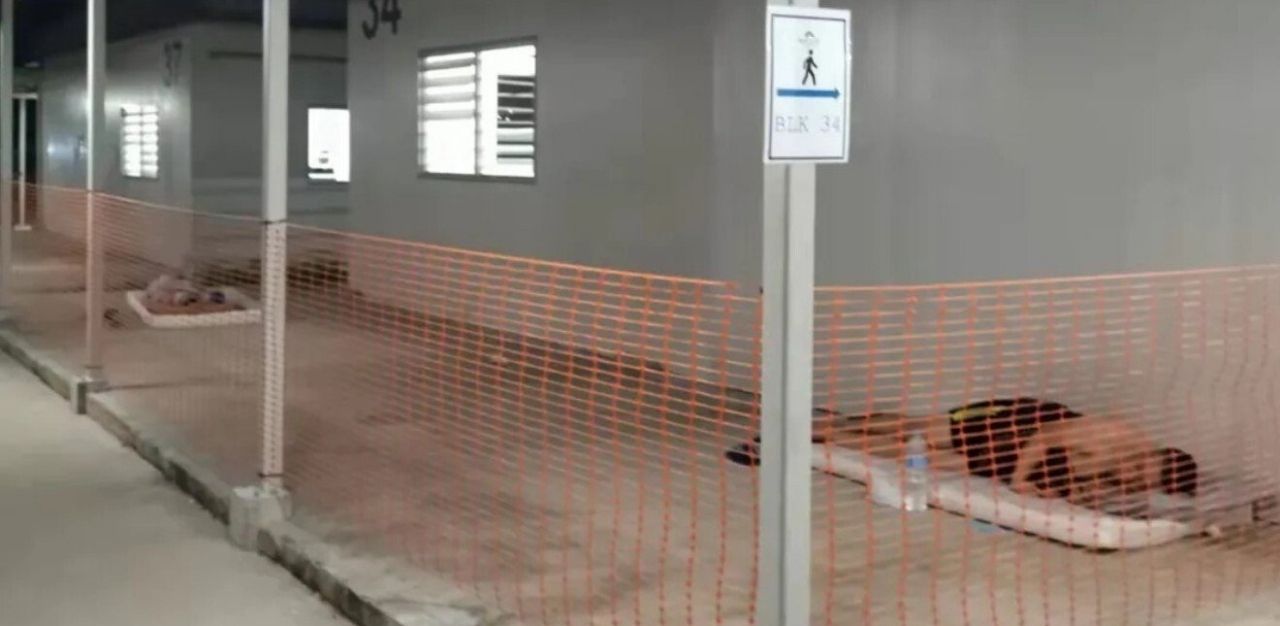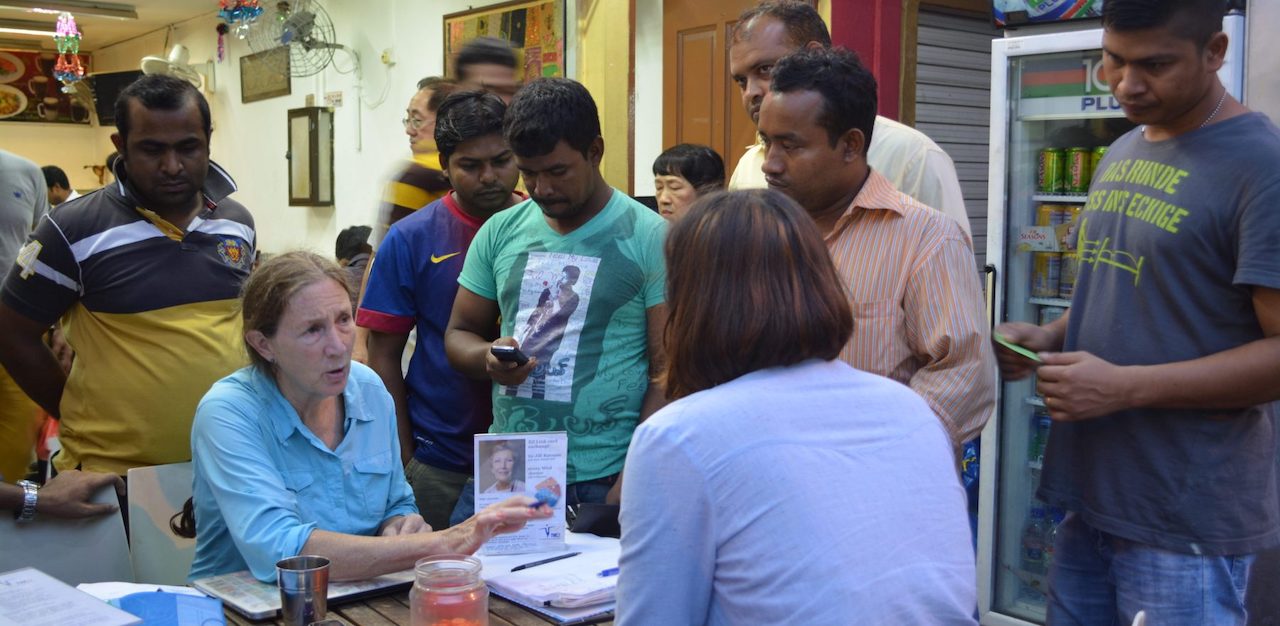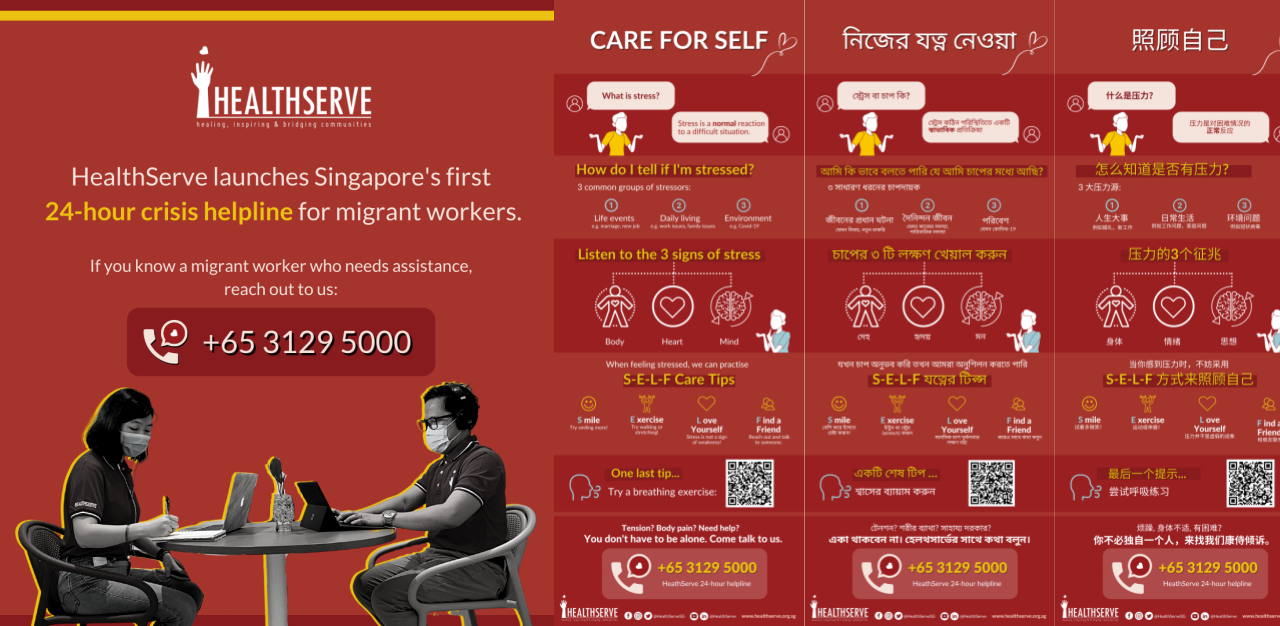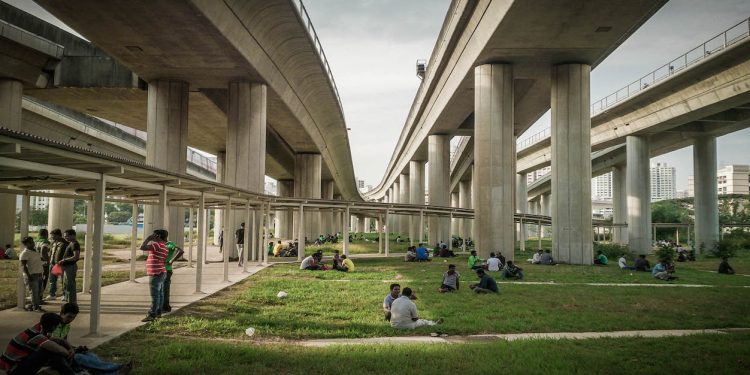In 2021, calls for the government to outlaw the ferrying of migrant workers in the back of lorries came after three accidents in the span of two months and two lives were claimed.
This was not the first time such attention was brought up. The same issue was initially brought up twelve years ago, but fell on deaf ears when the Land Transport Authority (LTA) and the Ministry of Manpower (MOM) rejected the need for regulation.
Disputes over unpaid salaries — an unfortunate feature of the migrant worker-employer relationship — have also been a part of the wider discourse surrounding migrant rights and exploitation for years, albeit somewhat confined to the migrant rights space.
The recent viral TikTok video of a confrontation between a migrant worker and his employer over unpaid salaries has, however, propelled the issue into mainstream consciousness. In the same week, riot police were dispatched to a larger conflict at the Westlite Jalan Tukang dormitory where a major lapse in Covid isolation protocols had left healthy workers sleeping in the same rooms as infected ones.
Photos circulating online showed workers sleeping on drain covers and mattresses outside of their rooms, possibly in an attempt to self-isolate. Reports of poor quality food containing insects and hair also added to the tension, culminating in the confrontation.

Addressing Parliament on 1 November after MOM’s investigation, Senior Minister of State for Manpower Koh Poh Koon said that the incident was a result of the compounded failings of multiple stakeholders.
“In summary, there were shortcomings by all parties. On the employer’s part, workers were upset and had raised issues about food quality and hygiene. On the dormitory operator’s part, they struggled to cope with the surge in numbers. On ACE’s (Assurance, Care and Engagement Group) part, we stepped in but did not put in sufficient resources in time to resolve the problem,” he said.
Who cares about migrant rights?
The migrant rights space in Singapore has seen active participation from as far back as 2004. Veteran advocacy groups such as TWC2 and HOME have been joined by a constant stream of new players over the years, each filling a needs gap for the million-strong community, and each with their own unique mission. Almost two decades on, the migrant rights movement today is as determined as it has ever been, although gaps still persist.
In July this year (2021), a coalition of nonprofits, law firms and universities banded together to form the Migrant Workers’ Group (MWG) with the goal of enhancing legal awareness and access to justice among migrant workers in Singapore. A major hurdle, TheHomeGround Asia found, is in the lack of awareness among them of their rights under the law.
“MWG coalition members will be working collaboratively to provide workers with holistic socio-legal support, such as gratis psychosocial and legal counselling, shelter, and basic legal guidance or even legal representation where suitable,” says the spokesperson from the Law Society Pro Bono Services (LSPBS), the charity responsible for bringing the coalition together.
“The migrant worker’s awareness of his rights and the obligations of employers are key aspects to protecting them,” says Ms Lim Lei Theng, a partner at Allen & Gledhill LLP. The law firm is a member of MWG.
In her previous role at the NUS Centre for Pro Bono & Clinical Legal Education, Ms Lim worked with the Tripartite Alliance for Dispute Management (TADM) — a mediator and advisory for salary disputes and claims formed by the MOM, SNEF and NTUC — and migrant worker nonprofits to raise legal awareness among migrant workers.
“One issue was getting the migrant workers to attend the talks. This was before the days of Covid-19. Many did not want to spend their precious days off listening to a talk, even when free food and goodie bags were provided,” she adds.
Nevertheless, raising salary disputes to the TADM has not always been straightforward even for the informed migrant worker.
Ms Debbie Fordyce, President of veteran advocacy outfit TWC2, says workers often do not receive the full salary they were owed. Most cases presented to the TADM often end in a mediated settlement, where the worker and employer are persuaded to meet halfway.
“This is not acceptable, because this means the worker is only paid an amount the employer is willing to pay,” she says. Understandably, such incidents have given rise to a degree of skepticism among workers and organisations in the space, especially when it comes to the impartiality of the state.

Mr Miah Bakul, a 32-year-old migrant worker from Bangladesh, says that it is common knowledge among his circle that MOM sides with employers “95 per cent of the time”.
Having worked for two employers during his time in Singapore, Mr Bakul has always been paid on time, but not always in the correct amount. On one occasion, his employer had refused to pay his overtime hours, leading him to lodge a complaint with MOM.
“When you go to MOM, they would ask for a record. If there is no record, they would say that they cannot help you,” he says. Proof of hours worked is one main obstacle migrant workers often face when seeking redress from the MOM. Most of them do not expect to be cheated out of their salaries so never saw the need to keep records. Some were also never given that option by employers.
In the case of the recent TikTok video where migrant workers confronted their employer over withheld salaries, MOM was quoted by AsiaOne as saying that the issue involved a “discretionary bonus purportedly not given by the employer as well as other employment and salary-related matters”.
But HOME told TheHomeGround Asia team that discretionary bonuses were rather unheard of.
“For all the workers who had approached us for help for unpaid salary, the non-payment or short payment was of basic or overtime wages rightfully due to them under the law, not discretionary bonuses,” says a spokesperson for HOME’s non-domestic casework team.
“In our observation, the vast majority of workers can understand when their employers are going through hard times. But given that we continue to see workers with a basic monthly salary of less than $300, they should be paid what is rightfully due to them,” she says.
How are migrant workers supported?
Formed at the height of the pandemic in April 2020 as a response to the crisis that had devastated migrant worker dormitories, the Covid-19 Migrant Support Coalition (CMSC) — another MWG member — is a ground-up initiative that has since gained a reputation for its work over the period. Focused on ground engagement with migrant workers and providing mental wellness and legal support, CMSC prides itself on the relationships it builds with the people it serves.
When asked about the avenues for migrant workers in Singapore to seek redress and allay concerns, co-founder of CMSC Renita Sophia Crasta pointed to a myriad of existing options.
“Where workers have any concerns, they are encouraged to raise this to their dorm operators, FACE ambassadors, who are migrant worker reps within each dorm, or MOM FAST team officers who may visit the dorms from time to time,” says Ms Crasta, who is a trained lawyer.
“Should a worker approach CMSC, we would endeavour to provide them with the relevant mental health or casework advice, including, if need be, escalating cases of concern to the relevant authorities so that they can step in on a timely basis to address the needs,” she adds.
Ms Crasta says another option would also be for them to speak to their employers, who should also care for their welfare and concern, and not just leave it to dorm operators.
But while lines of communication exist, access and awareness do not appear to be evenly distributed across the dormitories that house some 300,000 migrant workers. For instance, Mr Bakul says he has never seen or even heard of FACE ambassadors and FAST officers in his time at three different dormitories.
“There was only a security guard there. My employer doesn’t come to the dormitory, but we can call the employer [if any issue arises],” he says.
In August 2020, K. R. Ramesh, a South Indian migrant worker from Tamil Nadu, committed suicide in his dormitory after months of grappling with a mental health fallout precipitated by the harsh restrictions.
Reeling from the impact of the pandemic, Mr Ramesh’s employer had also failed to pay him his full salary, only forking out as little as $200 in some months.
“He didn’t have a regular salary and was struggling to send money home sometimes,” his wife, Ms Ramesh, tells us in Tamil. “His company provided meals but the food was often bad, so he had to cook in secrecy in the dorms. That also meant he had to spend money on food, and so couldn’t send us money sometimes.”
“He said if he didn’t eat, he wouldn’t have the energy to work. That’s what he struggled with too.”
Upon noticing signs of his mental health deteriorating, Mr Ramesh approached his friends and employer, who dismissed it and recommended that he take some Panadol.
Ms Ramesh had heard about the poor conditions but not her husband’s mental health issues. Now widowed, she continues to struggle to provide for her two daughters and mother-in-law in rural Tamil Nadu.
Evidently, employers’ actions are fundamental to workers’ well-being as they exercise a great deal of discretion in the treatment of workers, from living conditions and rents to salaries.
As such, various migrant worker nonprofits like CMSC consider it absolutely vital to engage employers, dorm operators and ACE.
Among them is Healthserve, a Christian nonprofit that provides migrant workers with medical care, counseling, case work and social assistance.
“We have been working closely with various stakeholders, including ACE, dorm operators and employers, to improve and support the workers’ overall wellbeing – both physical and psychological,” says Healthserve’s executive director Michael Cheah.

“Another way we do this is by promoting our new 24-hour crisis helpline for migrant workers. It is open to both distressed workers as well as members of the public, including dorm operators and employers who are concerned about workers’ welfare,” Mr Cheah adds.
The Migrant Workers’ Centre (MWC) has been operating a similar distress helpline since 2013, its executive director Bernard Menon says, adding that the intention has always been to provide a line of help for migrant workers in any kind of situation.
“We want them to know that whatever it is, we will be able to help, and that they don’t have to fear anything. If it’s something we’re not acquainted with, we will find the answer,” he says.
Welfare or structural change?
Ms Lim suggests that despite the occasional episode, the measures to protect migrant workers in Singapore “compare favourably” to those in places equally reliant on a migrant workforce, and that more often than not news of ill-treatment stem from bad actors hidden within the system.
“The problem lies in the actions of some individuals and companies who hire workers. We hear of the bad but not of the good. There are many who treat their migrant workers well,” she says.
TWC2, on the other hand, believes that not enough has been done in terms of policy changes, and that no amount of goodwill from any one actor or group of individuals will address the root cause of structural issues. What matters most, Ms Fordyce says, is still policy reform.
“I don’t think that solves the problem of the inability to switch jobs, the recruitment fees that will keep someone in debt for a year or longer, the difficulty in filing a successful salary claim, and the difficulty in accessing medical treatment for workplace injuries,” she says, pointing to TWC2’s mission to make work profitable and humane for migrant workers.
Nevertheless, there is increasing recognition within the space for the need to look past the material when it comes to promoting migrant worker rights. Ms Lim believes that public perception plays a huge role in any change.
“Singaporeans have a part to play in simply giving migrant workers the same respect that we expect from anyone else. It’s not about giving them charity, gifts, or free food. It’s about being glad to have them in the community. We need to give migrant workers the same consideration that we want,” she says.
Join the conversations on TheHomeGround Asia’s Facebook and Instagram, and get the latest updates via Telegram.














